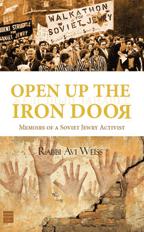
“Open Up the Iron Door” by Rabbi Avi Weiss. (Toby Press, April 2015)
When I lived in New York in 1960s and was active in Zionist circles, I recall being part of demonstrations and walks for Soviet Jewry. “Let My People Go” was the chant I remember most but “one, two, three, four, open up the iron door” was undoubtedly also part of our mantra.
From 1964 to 1971, the Student Struggle for Soviet Jewry (SSSJ) was the only American organization engaged in a full-time campaign for Soviet Jewry. {mprestriction ids="1,3"}Rabbi Avraham Weiss became an officer in 1971, accelerated SSSJ’s activist modes, and campaigned relentlessly for Anatoly Sharansky.
Rabbi Weiss, like many Soviet Jewry activists, was inspired by the Holocaust and the Civil Rights Movement.
This book is published in honor of the 25th anniversary of the mass immigration from the Soviet Union and the 50th anniversary of the establishment of the Student Struggle for Soviet Jewry.
This book focuses on the impact of grassroots activism and acts of civil disobedience, which led to important policy changes for the Soviet Jews.
During these years, there were religious reverberations and Orthodox opponents to demonstrations; the Kahane relationship; the role of the Jewish establishment; immense efforts by Avital Sharansky to have her husband freed and more.
“Over the course of 28 years, despite discouraging hardships and setbacks, we kept the flame alight and succeeded in ways even we had never expected …,” writes Rabbi Weiss, who touches upon his own “struggles, triumphs, doubts, and ups and downs — physical, emotional, spiritual and intellectual — over the span of nearly three decades. This book is therefore both a personal memoir and the memoir of a great movement and how the two intersected.”
Today, at the age of 71, Rabbi Weiss is about to retire from the Hebrew Institute of Riverdale in The Bronx, New York, which he founded .He is also founder of Yeshivat Chovevei Torah, a rabbinical seminary he refers to as “Open Orthodox,” a term he coined to describe a form of Modern Orthodoxy; he is founder of Yeshivat Maharat for Orthodox women; co-founder of the International Rabbinical Fellowship, a Modern Orthodox rabbinical association founded as a liberal alternative to the Rabbinical Council of America; and founder of the grassroots organization Coalition for Jewish Concerns – Amcha.
For anyone who grew up in the 1960s and 1970s and participated in the struggle for Soviet Jewry or who wants to understand what this movement did, this is an essential read.
For anyone who wants to truly understand the inside activities of those who worked outside the establishment to open up the iron door of the Soviet Union, this is a must read.{/mprestriction}